
Polystyrene (PS) is a synthetic polymer made from monomers of the aromatic hydrocarbon styrene. Polystyrene can be solid or foamed. General-purpose polystyrene is clear, hard, and brittle. It is an inexpensive resin per unit weight. It is a poor barrier to oxygen and water vapour and has a relatively low melting point. Polystyrene is one of the most widely used plastics, the scale of its production being several million tonnes per year. Polystyrene can be naturally transparent, but can be colored with colorants. Uses include protective packaging, containers, lids, bottles, trays, tumblers, disposable cutlery, in the making of models, and as an alternative material for phonograph records.
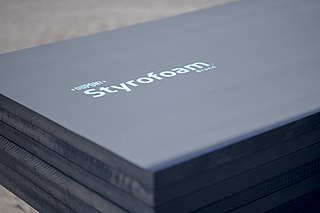
Styrofoam is a trademarked brand of closed-cell extruded polystyrene foam (XPS), commonly called "Blue Board", manufactured as foam continuous building insulation board used in walls, roofs, and foundations as thermal insulation and water barrier. This material is light blue in color and is owned and manufactured by DuPont. DuPont also has produced a line of green and white foam shapes for use in crafts and floral arrangements.
Hotwire or hot wire may refer to:
The molecular formula C8H8 may refer to:
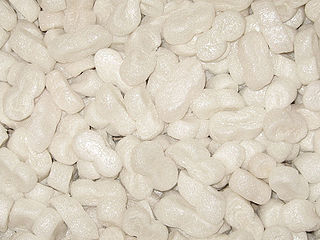
Foam peanuts, also known as foam popcorn, packing peanuts, or packing noodles, are a common loose-fill packaging and cushioning material used to prevent damage to fragile objects during shipping. They are shaped to interlock when compressed and free flow when not compressed. They are roughly the size and shape of an unshelled peanut and commonly made of expanded polystyrene foam. 50–75 millimetres of peanuts are typically used for cushioning and void filling packaging applications. The original patent was filed for by Robert E. Holden in 1962 and was granted in 1965.
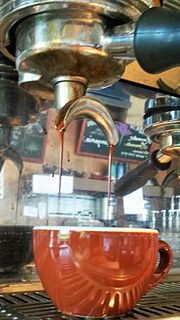
A coffee cup is a container that coffee and espresso-based drinks are served in. Coffee cups are typically made of glazed ceramic, and have a single handle for portability while the beverage is hot. Ceramic construction allows a beverage to be drunk while hot, providing insulation to the beverage, and quickly washed with cold water without fear of breakage, compared to typical glassware.

Polystyrene sulfonates are a group of medications used to treat high blood potassium. Effects generally take hours to days. They are also used to remove potassium, calcium, and sodium from solutions in technical applications.
In biology, a substrate is the surface on which an organism lives. A substrate can include biotic or abiotic materials and animals. For example, encrusting algae that lives on a rock can be itself a substrate for an animal that lives on top of the algae. Inert substrates are used as growing support materials in the hydroponic cultivation of plants. In biology substrates are often activated by the nanoscopic process of substrate presentation.
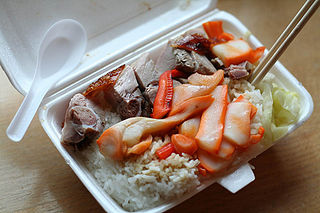
A foam food container is a form of disposable food packaging for various foods and beverages, such as processed instant noodles, raw meat from supermarkets, ice cream from ice cream parlors, cooked food from delicatessens or food stalls, or beverages like "coffee to go". They are also commonly used to serve takeout food from restaurants, and are also available by request for diners who wish to take home the remainder of their meal. The foam is a good thermal insulator, making the container easy to carry as well as keeping the food at the temperature it had when filled into the container, whether hot or cold.
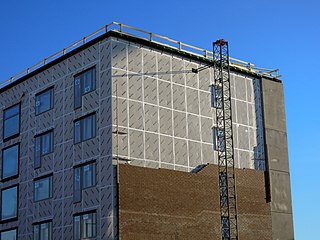
Rigid panel insulation, also referred to as continuous insulation, can be made from foam plastics such as polyurethane (PUR), polyisocyanurate (PIR), and polystyrene, or from fibrous materials such as fiberglass, rock and slag wool. Rigid panel continuous insulation is often used to provide a thermal break in the building envelope, thus reducing thermal bridging.

In polymer chemistry photo-oxidation is the degradation of a polymer surface due to the combined action of light and oxygen. It is the most significant factor in the weathering of plastics. Photo-oxidation causes the polymer chains to break, resulting in the material becoming increasingly brittle. This leads to mechanical failure and, at an advanced stage, the formation of microplastics. In textiles the process is called phototendering.
Planet Smoothie is the third largest American chain of smoothie stores serving smoothies. The company was founded in 1995 by Martin Sprock in Atlanta, Georgia, and currently operates more than 100 locations. In November, 2011, Planet Smoothie was acquired by Tasti D-Lite LLC who also operates Tasti D-Lite stores. In June 2015, Quick-Service Restaurant Franchisor Kahala Brands purchased both Planet Smoothie and Tasti D-Lite in a deal that brings their 128 locations into the portfolio of about a dozen fast food, treat and sandwich chains such as Blimpie and Cold Stone Creamery owned by the Serruya family of Canada. Together, the Tasti D-Lite and Planet Smoothie locations will now be run from the Kahala Brands corporate headquarters in Scottsdale, Arizona.

A polymeric foam is a foam, in liquid or solidified form, formed from polymers.
Styrofoam is a brand of insulation made from extruded polystyrene foam.
This page is based on this
Wikipedia article Text is available under the
CC BY-SA 4.0 license; additional terms may apply.
Images, videos and audio are available under their respective licenses.








